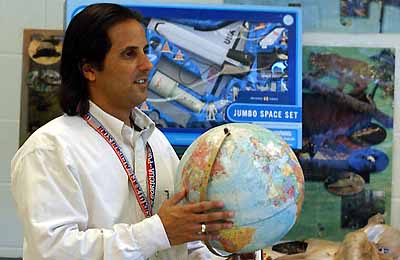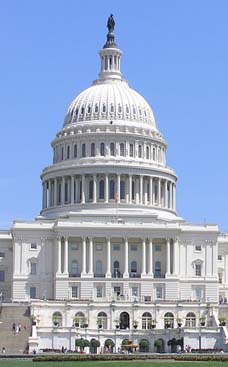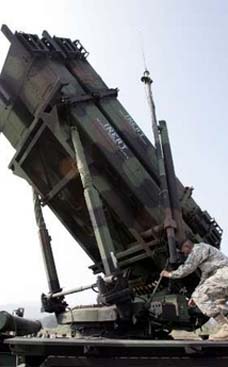2006.11.20: November 20, 2006: Headlines: Figures: COS - Dominican Republic: Space: Education: The Daily Toreador: NASA astronaut Joe Acaba speaks to Tech engineering students
Peace Corps Online:
Directory:
Dominican Republic:
Special Report: RPCV Joseph Acaba:
Joseph Acaba: Newest Stories:
2006.11.20: November 20, 2006: Headlines: Figures: COS - Dominican Republic: Space: Education: The Daily Toreador: NASA astronaut Joe Acaba speaks to Tech engineering students
NASA astronaut Joe Acaba speaks to Tech engineering students

Acaba said much of the experience he gained during the 18-month basic astronaut training course focused on team-building and working in a high-stress environment as opposed to the more technical aspects of the job. "We're not all rocket scientists," he said. "We're just the trained monkeys that flip the switches, but we have to learn to work under pressure." Though there were many facets of training where this mentality was applicable, Acaba said he believed the training he received in piloting super-sonic jets was where the need to act quickly under pressure became vital. "When you're moving that fast things are happening pretty quickly," he said. "If you ever have time to look around and say, 'Ooh, it's a nice day outside,' then there's something you should be doing." Dominican Republic RPCV Joe Acaba is a Mission Specialist Educator Astronaut with NASA.
NASA astronaut Joe Acaba speaks to Tech engineering students
NASA astronaut speaks to Tech engineering students
Josh Hull
Issue date: 11/20/06 Section: News
Most people hope to find a career that is out of this world, but for Joe Acaba, the dream has become a reality.
Acaba, who was chosen by NASA as one of three educators for the 2004 astronaut class, spoke Thursday and Friday to students across Lubbock, with two appearances at Texas Tech.
As a former middle school and high school teacher, Acaba said he wanted students to focus on the importance of diversity of experience early on in their academic careers.
Prior to his teaching career, Acaba, was a member of both the Marine Corps and the Peace Corps, experiences he said he believes made him stand out during the astronaut selection process. He said although it was never his goal in life to become an astronaut, his interest in the space program formed when he was young boy watching videos of the moon landings with his father.
"Back then I remember thinking that was something I wanted to do," he said. "Because of life's choices I didn't think that could happen until I saw the ad on the Internet that said NASA was looking for educators."
While speaking to engineering students Friday at Tech, Acaba said the process of becoming an astronaut is both mentally and physically demanding, even during the interview process.
"Sixty to 70 percent of our time was spent in the clinic for the interview," he said. "It was a heck of a physical, but that's really what kept a lot of people out."
Acaba said much of the experience he gained during the 18-month basic astronaut training course focused on team-building and working in a high-stress environment as opposed to the more technical aspects of the job.
"We're not all rocket scientists," he said. "We're just the trained monkeys that flip the switches, but we have to learn to work under pressure."
Though there were many facets of training where this mentality was applicable, Acaba said he believed the training he received in piloting super-sonic jets was where the need to act quickly under pressure became vital.
"When you're moving that fast things are happening pretty quickly," he said. "If you ever have time to look around and say, 'Ooh, it's a nice day outside,' then there's something you should be doing."
Acaba said because he does not expect to make his first trip into space until sometime after 2009, he hopes students in the engineering field will continue to develop technology that will be an integral part of the future of the space program.
"People ask why it's so expensive and why it takes so long to get into space. It's because everything has to be certified," he said. "The technology you are certifying right now takes a lot less time because of the programming being developed."
Jeff Woldstad, associate dean in the College of Engineering, said he believes Acaba's presentation was very informative for students interested in the future of space travel.
"In terms of the space program, we have research programs, but we really don't have too much to help them beside what they figure out they want to do on their own," Woldstad said. "I think he's just here to talk about NASA and what's going on."
Didiana Rojas, a junior chemical engineering major from El Paso and member of the Society of Hispanic Professional Engineers, said she was glad her group could host Acaba in the College of Engineering because she believes his presentation addressed key projects facing the engineers of the future.
"It's really interesting just knowing how his training was and how he got to where he was being an educator," Rojas said. "I'm actually interested in biomedical engineering, and I've always wanted to work with NASA since I was little."
Acaba said being an astronaut is an experience he could never have passed up, but he knows the classroom will always be there.
"Teachers go out and inspire everyday," he said. "I never would have left the classroom for anything other than being an astronaut."
Links to Related Topics (Tags):
Headlines: November, 2006; RPCV Joseph Acaba (Dominican Republic); COS - Dominican Republic; Space; Education
When this story was posted in November 2006, this was on the front page of PCOL:





Peace Corps Online The Independent News Forum serving Returned Peace Corps Volunteers
 | Ron Tschetter in Morocco and Jordan
On his first official trip since being confirmed as Peace Corps Director, Ron Tschetter (shown at left with PCV Tia Tucker) is on a ten day trip to Morocco and Jordan. Traveling with his wife (Both are RPCVs.), Tschetter met with volunteers in Morocco working in environment, youth development, health, and small business development. He began his trip to Jordan by meeting with His Majesty King Abdullah II and Her Majesty Queen Rania Al Abdullah and discussed expanding the program there in the near future. |
 | Chris Dodd's Vision for the Peace Corps
Senator Chris Dodd (RPCV Dominican Republic) spoke at the ceremony for this year's Shriver Award and elaborated on issues he raised at Ron Tschetter's hearings. Dodd plans to introduce legislation that may include: setting aside a portion of Peace Corps' budget as seed money for demonstration projects and third goal activities (after adjusting the annual budget upward to accommodate the added expense), more volunteer input into Peace Corps operations, removing medical, healthcare and tax impediments that discourage older volunteers, providing more transparency in the medical screening and appeals process, a more comprehensive health safety net for recently-returned volunteers, and authorizing volunteers to accept, under certain circumstances, private donations to support their development projects. He plans to circulate draft legislation for review to members of the Peace Corps community and welcomes RPCV comments. |
 | He served with honor
One year ago, Staff Sgt. Robert J. Paul (RPCV Kenya) carried on an ongoing dialog on this website on the military and the peace corps and his role as a member of a Civil Affairs Team in Iraq and Afghanistan. We have just received a report that Sargeant Paul has been killed by a car bomb in Kabul. Words cannot express our feeling of loss for this tremendous injury to the entire RPCV community. Most of us didn't know him personally but we knew him from his words. Our thoughts go out to his family and friends. He was one of ours and he served with honor. |
 | Peace Corps' Screening and Medical Clearance
The purpose of Peace Corps' screening and medical clearance process is to ensure safe accommodation for applicants and minimize undue risk exposure for volunteers to allow PCVS to complete their service without compromising their entry health status. To further these goals, PCOL has obtained a copy of the Peace Corps Screening Guidelines Manual through the Freedom of Information Act (FOIA) and has posted it in the "Peace Corps Library." Applicants and Medical Professionals (especially those who have already served as volunteers) are urged to review the guidelines and leave their comments and suggestions. Then read the story of one RPCV's journey through medical screening and his suggestions for changes to the process. |
 | The Peace Corps is "fashionable" again
The LA Times says that "the Peace Corps is booming again and "It's hard to know exactly what's behind the resurgence." PCOL Comment: Since the founding of the Peace Corps 45 years ago, Americans have answered Kennedy's call: "Ask not what your country can do for you--ask what you can do for your country. My fellow citizens of the world: ask not what America will do for you, but what together we can do for the freedom of man." Over 182,000 have served. Another 200,000 have applied and been unable to serve because of lack of Congressional funding. The Peace Corps has never gone out of fashion. It's Congress that hasn't been keeping pace. |
 | PCOL readership increases 100%
Monthly readership on "Peace Corps Online" has increased in the past twelve months to 350,000 visitors - over eleven thousand every day - a 100% increase since this time last year. Thanks again, RPCVs and Friends of the Peace Corps, for making PCOL your source of information for the Peace Corps community. And thanks for supporting the Peace Corps Library and History of the Peace Corps. Stay tuned, the best is yet to come. |
 | History of the Peace Corps
PCOL is proud to announce that Phase One of the "History of the Peace Corps" is now available online. This installment includes over 5,000 pages of primary source documents from the archives of the Peace Corps including every issue of "Peace Corps News," "Peace Corps Times," "Peace Corps Volunteer," "Action Update," and every annual report of the Peace Corps to Congress since 1961. "Ask Not" is an ongoing project. Read how you can help. |
Read the stories and leave your comments.

Some postings on Peace Corps Online are provided to the individual members of this group without permission of the copyright owner for the non-profit purposes of criticism, comment, education, scholarship, and research under the "Fair Use" provisions of U.S. Government copyright laws and they may not be distributed further without permission of the copyright owner. Peace Corps Online does not vouch for the accuracy of the content of the postings, which is the sole responsibility of the copyright holder.
Story Source: The Daily Toreador
This story has been posted in the following forums: : Headlines; Figures; COS - Dominican Republic; Space; Education
PCOL35259
41


















